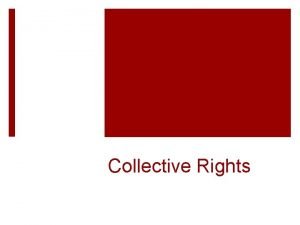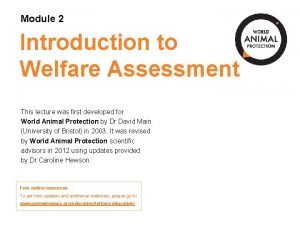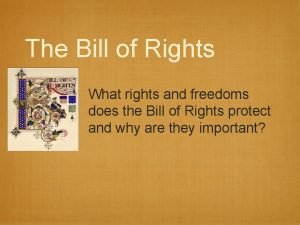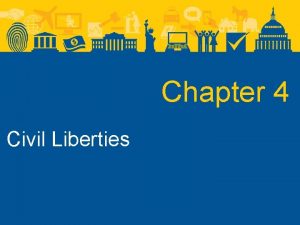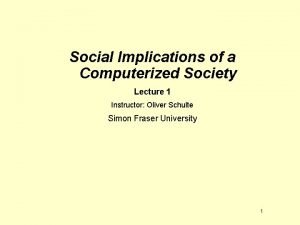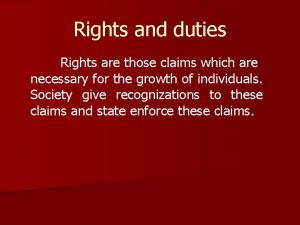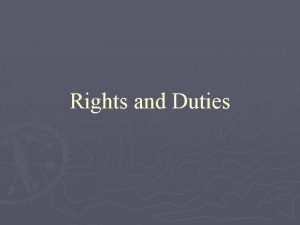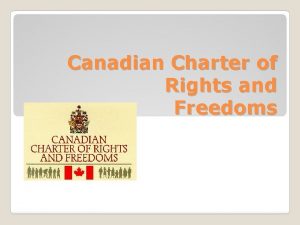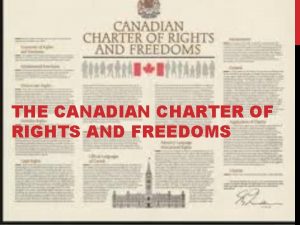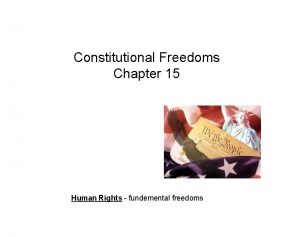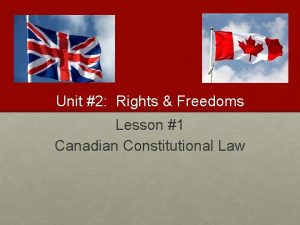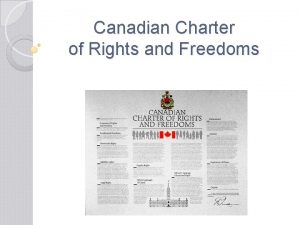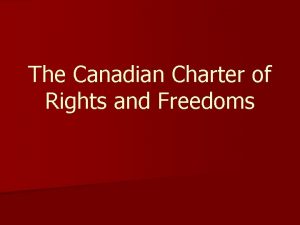Unit 2 Rights and Freedoms Studying the Canadian











- Slides: 11

Unit 2: Rights and Freedoms Studying the Canadian Charter of Rights and Freedoms

Timeline of the Evolution of Rights and Freedoms in Canada 1928 - Persons Case: Supreme Court decides that the word ‘person’ does not apply to women. 1929 - British Privy Council ruled that women were persons and qualified to run for the Senate. 1942 - Beginning of internment of Japanese Canadians: all their rights were taken away.

Timeline of the Evolution of Rights and Freedoms in Canada 1945 - John Diefenbaker introduces the idea of legislation guaranteeing the rights of Canadians to Parliament. 1945 -1955 - Great discussion and controversy. Some preferred the tradition of depending on common law and the courts to protect citizen’s rights. Others thought that written legislation would be more effective.

Timeline of the Evolution of Rights and Freedoms in Canada 1957 and 1958 - During election campaigns, John Diefenbaker, as leader of the Progressive Conservative party, promised a federal Bill of Rights if he was elected. 1960 - On August 10 th, 1960, the Canadian Bill of Rights became law. 1980 - Quebec holds referendum on separation. Prime Minister Trudeau promises to change the Constitution.

Timeline of the Evolution of Rights and Freedoms in Canada 1981 - At a conference, Trudeau and nine of the provincial premiers agree upon an amending formula for the constitution and a Charter of Rights and Freedoms. Quebec does not sign. 1982 - The Constitution Act, 1982, with the Charter of Rights and Freedoms, becomes law

Basic Terms See Work Sheet

Scenarios - indicate the section of the Charter being dealt with and the violation. • • John Smith, a law abiding Canadian citizen, decides to go on a trip to Europe. When he arrives at the airport, he is told that he is not allowed to leave Canada. No reason is given by the authorities. Jean Chretien decides that he wants to be Prime Minister for life and refuses to call an election.

Scenarios - indicate the section of the Charter being dealt with and the violation. 3. The police walk into your home and start searching for drugs. 4. The province of Ontario decides that it will no longer allow Canadians from other provinces to work and live in Ontario. 5. The government decides that all churches are to be closed down permanently. 6. Recent immigrants, who speak little English, are very confused at their criminal trial because they do not understand what is being said.

Scenarios - indicate the section of the Charter being dealt with and the violation. 7. The police do not have to treat all groups of Canadians the same. They are allowed to discriminate against teenagers, Clergy, and certain ethnic groups. 8. A judge orders that a person receive 25 lashes for a punishment. 9. You are arrested and thrown in jail. You are not told the charges for two weeks. With no reason given, you are denied bail for a minor shoplifting offence. Finally, after one year in prison, you get your day in court. Unfortunately, you are defending yourself because you are unable to pay for a lawyer.

Scenarios - indicate the section of the Charter being dealt with and the violation. 1. 10. You are not allowed by the government to join an environmental group that protests cutting down trees. 2. 11. You testify at a trial about a break and enter. Later, the police arrest you because of your testimony. 3. 12. Canada has one official language French. If you speak English and need help from the government, you are out of luck. 4. 13. In Canada, men have more rights than women.

Scenarios 1. 14. The government does not like comments written in a major newspaper because they are critical of the government’s actions. As a result, the newspaper is not allowed to publish any more. 2. 15. You have been fired from your job because of the colour of your hair. You try to get help but no court is willing to hear your case
 What laws recognize the collective rights of the metis
What laws recognize the collective rights of the metis Four freedoms of the eu
Four freedoms of the eu Four freedoms of the eu
Four freedoms of the eu The 5 freedoms animal welfare
The 5 freedoms animal welfare Freedoms foundation teacher programs
Freedoms foundation teacher programs Freedoms
Freedoms Freedoms
Freedoms Chapter 4 civil liberties
Chapter 4 civil liberties Chapter 19 civil liberties first amendment freedoms
Chapter 19 civil liberties first amendment freedoms Positive vs negative rights
Positive vs negative rights Conclusion of rights
Conclusion of rights Legal rights vs moral rights
Legal rights vs moral rights
